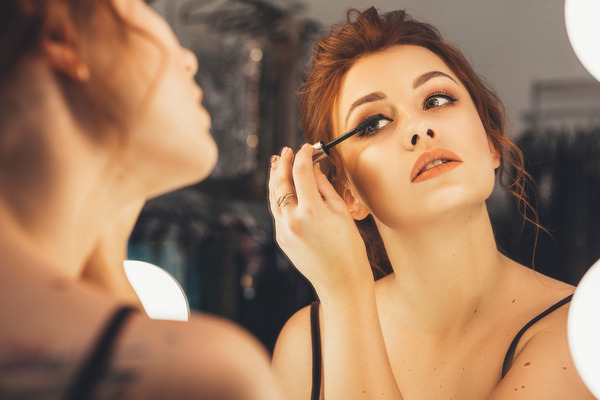Are you obsessed by your ‘physical defects’? Do you think you have an ugly nose or a body part that is too imperfect? Discover what body dysmorphia is and how it affects your perception

The perfect bodies of the models and the images full of social media filters can affect the perception of our body constitution. In many cases, the person can even develop a psychological pathology: dysmorphophobia or body dysmorphia This body image disorder translates into an obsession with our image. Something that can lead to the use of cosmetic surgeries, the excessive use of body creams or even problems with eating. But why does this obsession with our body arise?
What is body dysmorphia or body dysmorphic disorder?
Dysmorphophobia, better known as body dysmorphia or body dysmorphic disorder, is a psychological pathology characterized by excessive concern about the body and physical appearance. In this way, the person who suffers from it ends up suffering a distortion of body image that makes them obsessed with it in such a way that they modify various aspects of their life to put an end to it.
One of the main characteristics of body dysmorphic disorder is that thoughts regarding the ‘defect’ or ‘complex’ that the person has end up taking up much of their daily concerns. So much so that the people with dysmorphophobia They end up having constant obsessive thoughts about aesthetic changes, weight loss and behaviors to end the ‘error’ they see in them.
Symptoms of body dysmorphic disorder or dysmorphophobia
Body dysmorphic disorder can occur in either one facial and body dysmorphia The following symptoms usually appear in most people who suffer from dysmorphophobia.
- Using clothing or makeup to hide certain dysmorphic features: In many cases the concern about the mental drawing that the people with dysmorphia It is usually such that they end up being ashamed of their supposed defects. So much so that they end up trying to hide them with excess makeup or wearing loose clothing so that they go unnoticed in front of others.
- Excess importance to appearance: When a person looks in the mirror too much this can be a sign that they are suffering from body dysmorphia. In this way, the subject can dedicate a large part of their time to thinking or performing certain actions to treat what they can detect as ‘physical defects’ or ‘ugly bodies’ ‘.

- Applying too many cosmetic surgery treatments: Cosmetic surgery can be useful in some cases. But when it becomes an obsession and you resort to the operating room too much, this can end up being a unreal beauty syndrome Therefore, it ends in a distortion of the body image in search of a perfection that will never be achieved.
- Seek constant approval from others: This disorder and its meaning It is usually related to a tendency of the person who suffers from dysmorphia to want the constant approval of others. So much so that a negative comment can lead the person to become obsessed with the trait that has been criticized.
- Excessive use of creams, diets or aesthetic devices: The dysmorphophobia It can also affect the excessive purchase of creams, diets and constantly resorting to miraculous treatments that end up harming the economy and also the health of the person who suffers from it.
When a person has excessive concern about a characteristic of a body completely healthy this can be a warning sign that there is a psychological problem. If you think you may be a victim of body dysmorphia, do not hesitate to contact a professional psychologist.
What are the most common obsessions of this body image disorder?
There are certain differences between a body dysmorphic disorder to another. But the reality is that in the vast majority of cases this translates into an obsession with the following body features.
- Skin imperfections: They include wrinkles, scars, acne and blemishes.
- Hair: this may include hair on the head or the absence of hair on the body.
- Facial dysmorphia: Very often this involves the idea of an ugly nose, but it can also affect vision in the shape and size of any other facial feature.
- Body weight: Sufferers may become obsessed with their weight or muscle tone. So much so that muscle dysmorphia is also a widespread psychological pathology today.
Other areas of concern that are often related to body dysmorphia They include penis size, muscles, breasts, thighs, buttocks, and the presence of certain body odors.

Causes of body dysmorphia
According to various studies, it is suggested that the body dysmorphic disorder or dysmorphophobia It involves a problem with the functioning of certain areas of the brain that process information about our bodily appearances. Even so, psychologists also highlight the following causes.
- Thaumas around the body: Bullying can be one of the triggers of body dimorphism Having been teased about an aspect of our body can turn into dysmorphic traits.
- Low self-esteem: An excess of low self-esteem can also induce these body problems
- Excessive consumption of social networks: Social networks can foster a ‘perfect beauty syndrome ‘ through the constant bombardment of images that deceive the brain and our body perception.
How to avoid body dysmorphia?
There are a series of attitudes that we can learn to put aside everything related to the constant comparison with others and the body dysmorphia or dysmorphophobia According to psychologists, we should focus on the following.
- Avoid comparisons: Comparison with others, especially through social networks, can make us suffer. facial or body dysmorphia For this reason, it is essential to focus on yourself, work on improving but without obsessing about it.

- Work on self-esteem: Self-esteem is one of the pending issues in today’s society. For this reason, body dysmorphia is affecting more and more people. Working within ourselves is one of the keys to not only leave aside this type of dysmorphic features but to achieve what we want so much in our lives.
- Accept our defects: Everyone has defects Therefore it is vital to learn to accept them without settling for them. You can work to minimize them and make your virtues more visible, but they will always be there. So acceptance is the secret to seeing yourself better and attracting others more.
- Fight negative thoughts: Comparisons and insecurities are usually related to a constant flow of negative thoughts. In many cases this body image disorder It is related to experiences of being laughed at. Therefore, it is vital not to focus on these intrusive memories or thoughts, but on those moments when people have highlighted the most beautiful things about you.
The body dysmorphia or dysmorphophobia It is a disease that is increasingly present in our society due to the great importance we give to beauty, surface and perfection. Despite this, accepting ourselves as we are and seeing the virtues of our body is in our hands through inner work. Therefore, consulting with a professional psychologist can be your best weapon to awaken the most beautiful thing in you.








